What to Do If Your Chinchilla Stops Eating
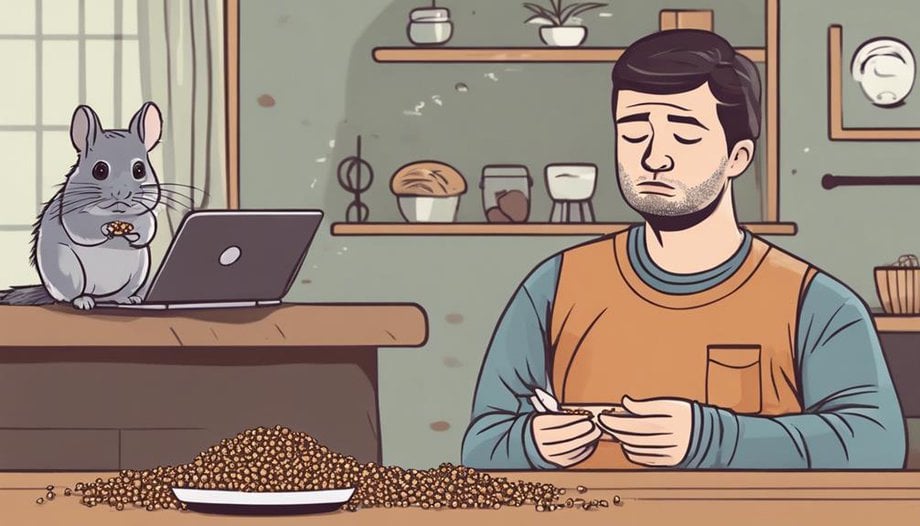
Chinchillas are known for their healthy appetites, so it can be concerning if your chinchilla stops eating. There are various reasons why a chinchilla may lose its appetite. It could be due to stress, dental problems, digestive issues, or an underlying health condition. If your chinchilla is not eating, it is essential to monitor its behavior closely and consult a veterinarian for a proper diagnosis.
Some solutions to encourage your chinchilla to eat include offering fresh hay, providing a variety of safe treats, ensuring a clean and comfortable environment, and giving your pet plenty of exercise and mental stimulation. Additionally, you can try offering fresh vegetables or herbs to entice your chinchilla to eat. Remember to always provide fresh water and seek veterinary advice if your chinchilla continues to refuse food.
Potential Causes of Appetite Loss
If your chinchilla suddenly stops eating, it could be due to various potential causes that require prompt attention. One common reason for appetite loss in chinchillas is dietary changes. Chinchillas have sensitive digestive systems, so any sudden alterations in their food can lead to stomach upset and refusal to eat. It’s crucial to introduce new foods gradually to prevent digestive issues that could result in appetite loss.
Another essential aspect to consider when dealing with a chinchilla that has stopped eating is illness prevention. Chinchillas are prone to various health problems, and illnesses can significantly impact their appetite. Ensuring that your chinchilla has regular check-ups with a veterinarian and maintaining a clean living environment can help prevent many illnesses that might cause appetite loss.
Signs of Malnutrition in Chinchillas
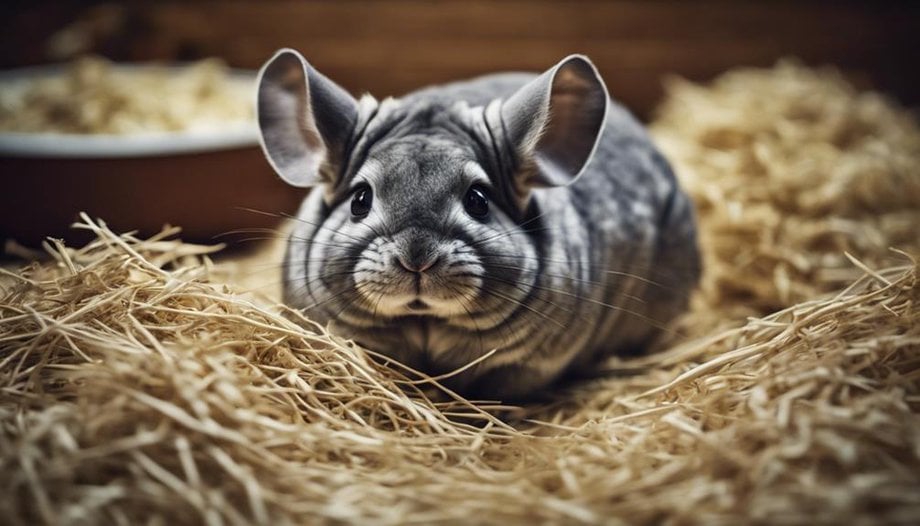
When chinchillas experience malnutrition, there are telltale signs to watch for. Weight loss can be an indication that your chinchilla isn’t getting the necessary nutrients.
Additionally, a dull fur texture and reduced energy levels may also be signs of malnutrition in these small, delicate animals.
Weight Loss Indication
Weight loss in chinchillas can be a significant indication of malnutrition, warranting immediate attention and care from the owner. Monitoring your chinchilla’s weight is crucial for their well-being. Below is a table detailing the average weight of a healthy chinchilla and signs of weight loss to watch for:
| Healthy Weight | Signs of Weight Loss |
|---|---|
| 500-800 grams | Visible ribs |
| Reduced activity level | |
| Loss of appetite |
If you notice your chinchilla losing weight, it’s essential to consult a veterinarian specializing in exotic pets. They can provide guidance on weight management and dietary preferences tailored to your chinchilla’s needs. Prioritizing your chinchilla’s nutrition is key to maintaining their health and well-being.
Dull Fur Texture
A chinchilla’s dull fur texture can be a clear indication of malnutrition, signaling the need for immediate attention and dietary adjustments. Proper fur grooming is essential for chinchillas to maintain their luxurious and soft fur.
When a chinchilla’s diet lacks vital nutrients, their fur can lose its luster, becoming dull and rough to the touch. Inadequate nutrition can also lead to dental issues, as chinchillas’ teeth continuously grow and require proper nutrients to wear down naturally.
Regularly inspecting your chinchilla’s fur quality can provide insights into their overall health. If you notice a change in their fur texture, it’s crucial to consult with a veterinarian to address any underlying dietary deficiencies promptly.
Reduced Energy Levels
Inspecting a chinchilla’s energy levels is crucial in identifying signs of malnutrition, with reduced activity serving as a key indicator of underlying dietary deficiencies.
A chinchilla that seems lethargic, uninterested in playtime, or less active than usual may be experiencing a lack of essential nutrients. To address this issue, consider incorporating energy supplements into their diet to boost their vitality. Additionally, appetite stimulants can help stimulate their interest in food, aiding in the intake of necessary nutrients.
Observing and responding promptly to these signs of reduced energy levels can significantly impact your chinchilla’s overall health and well-being. Remember, seeking advice from a veterinarian experienced with chinchillas is always recommended to ensure the best care for your furry friend.
Importance of Timely Veterinary Care
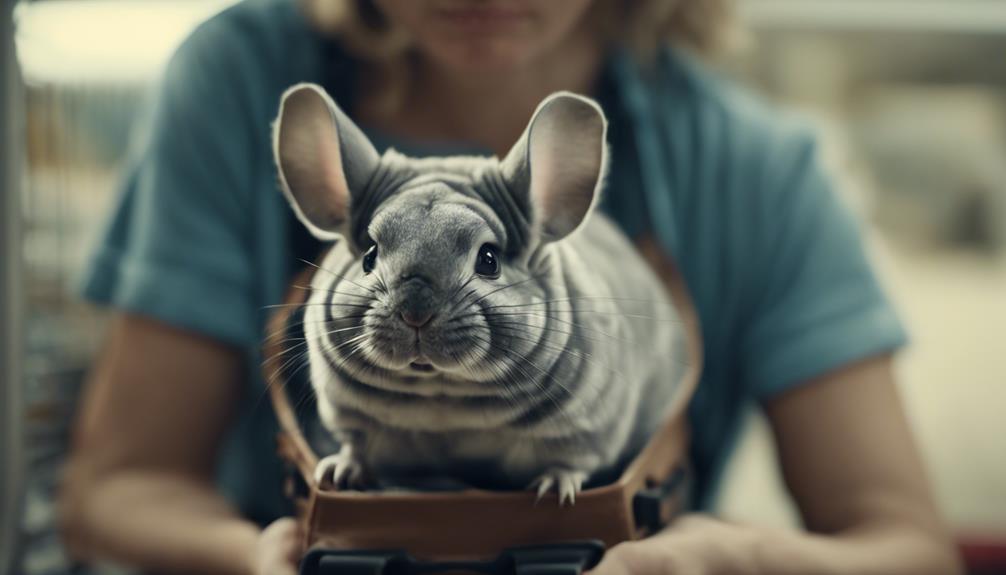
When a chinchilla stops eating, timely veterinary care becomes crucial.
A prompt check-up can help identify any underlying health issues and ensure the appropriate treatment is administered.
Early intervention often makes a significant difference in the chinchilla’s recovery and overall well-being.
Timely Vet Check-Up
Ensuring timely veterinary care for your chinchilla is crucial for addressing any underlying health issues promptly. Regular check-ups with a knowledgeable exotic animal vet can help in detecting potential problems early on. During these check-ups, dietary adjustments can be recommended based on your chinchilla’s specific needs.
Prompt Treatment Crucial
Timely veterinary care is crucial for promptly addressing any health issues that may be affecting your chinchilla’s well-being. In case of emergency, swift action is vital. Additionally, providing the right nutritional support is essential to aid in your chinchilla’s recovery. Seeking veterinary consultation at the earliest sign of trouble is highly recommended. Below is a table outlining key actions to take when faced with a chinchilla health crisis:
| Emergency Response | Feeding Techniques | Nutritional Support |
|---|---|---|
| Contact Vet Immediately | Offer Fresh Hay and Pellets | Provide Vitamin C |
| Keep Calm and Comfortable | Ensure Fresh Water Access | Include Leafy Greens |
| Monitor Breathing | Avoid High-Fat Treats | Introduce Critical Care |
Early Intervention Saves
An immediate response to any signs of health concerns in your chinchilla can significantly impact their well-being and recovery. Behavioral modifications and feeding techniques play a crucial role in early intervention.
When noticing a decrease in appetite or unusual behavior, swift action is necessary. Timely veterinary care is essential to address underlying issues promptly. A knowledgeable vet can provide guidance on feeding strategies tailored to your chinchilla’s needs.
Implementing these feeding techniques, such as offering a variety of fresh hay and high-quality pellets, can encourage your chinchilla to eat. Additionally, behavioral modifications, like creating a peaceful environment and minimizing stressors, can aid in their recovery.
Home Care Strategies for Encouraging Eating
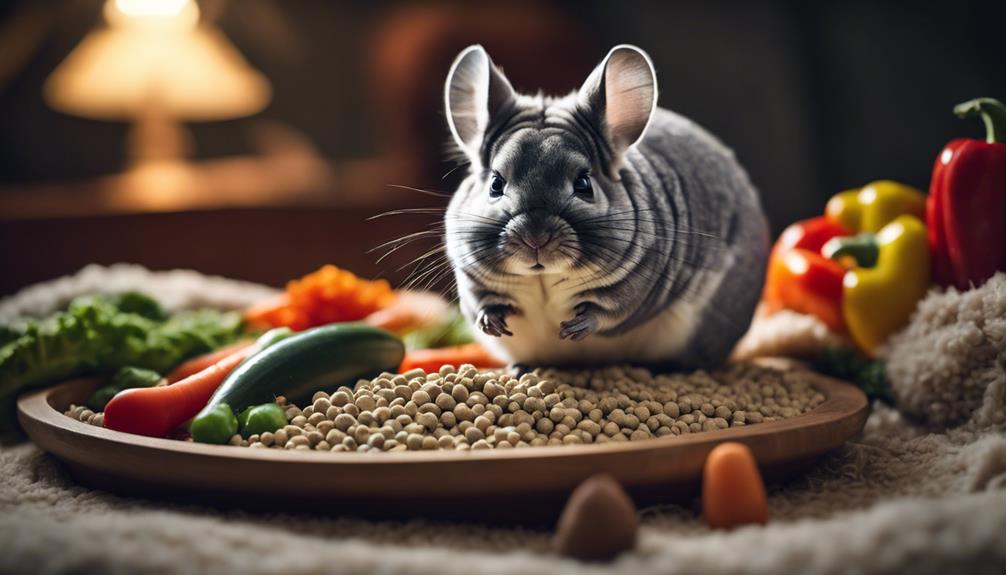
To support a chinchilla in regaining their appetite at home, consider implementing gentle coaxing methods and offering a diverse selection of fresh, high-quality hay and pellets. Chinchillas, like humans, can have preferences when it comes to food. Understanding what your chinchilla likes can help encourage them to eat more willingly. Additionally, sticking to a consistent feeding schedule can provide a sense of routine and security for your pet, which may help stimulate their appetite.
Home Care Strategies for Encouraging Eating:
- Variety is Key: Offer a mix of different types of hay and pellets to cater to your chinchilla’s taste preferences.
- Hand-Feeding: Try hand-feeding your chinchilla small amounts of food to entice them to eat.
- Freshness Matters: Ensure that the hay and pellets provided are fresh and of high quality to appeal to your chinchilla’s senses.
- Quiet Environment: Create a calm and quiet eating environment for your chinchilla to reduce stress and distractions while they eat.
Monitoring Chinchilla’s Hydration Levels
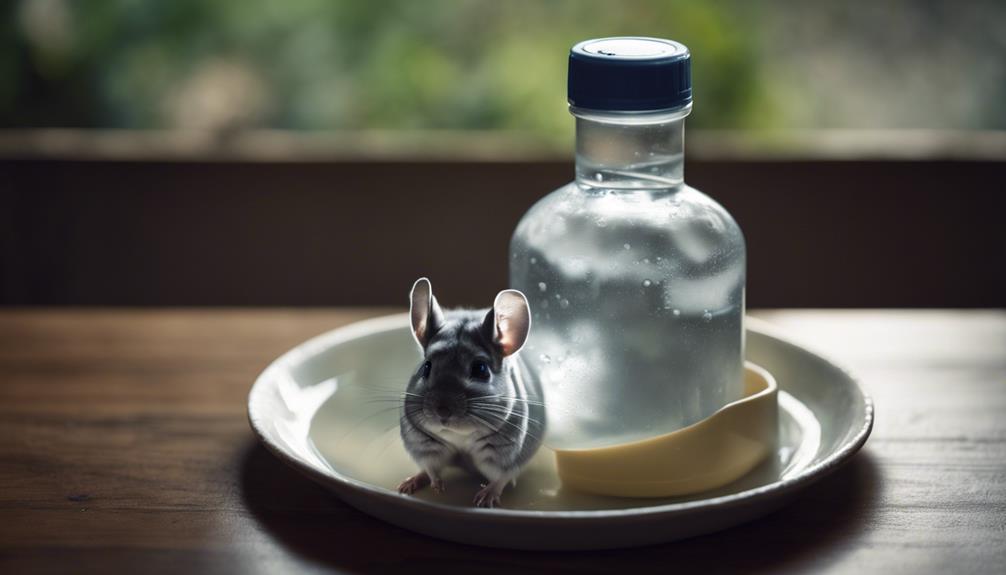
To ensure your chinchilla’s well-being during a period of decreased appetite, closely monitor their hydration levels as dehydration can exacerbate their overall condition. Hydration monitoring is crucial as chinchillas obtain most of their water from their food, and reduced eating can lead to decreased water intake. If your chinchilla is not eating, it’s essential to encourage them to drink water regularly and monitor the amount they are consuming. Additionally, consulting a veterinarian for guidance on hydration monitoring and potential interventions is advisable to ensure your chinchilla remains healthy.
| Signs of Dehydration | Encouraging Hydration | Veterinary Consultation |
|---|---|---|
| Sunken eyes | Offer fresh water | Seek professional advice |
| Sticky or dry mouth | Provide watery fruits | Discuss hydration plan |
| Loss of skin elasticity | Use a water bottle | Follow vet recommendations |
| Lethargy | Monitor water intake | Consider fluid therapy |
| Decreased urine output | Hydrate with veggies | Regular check-ups |
Nutritional Supplements and Diet Adjustments
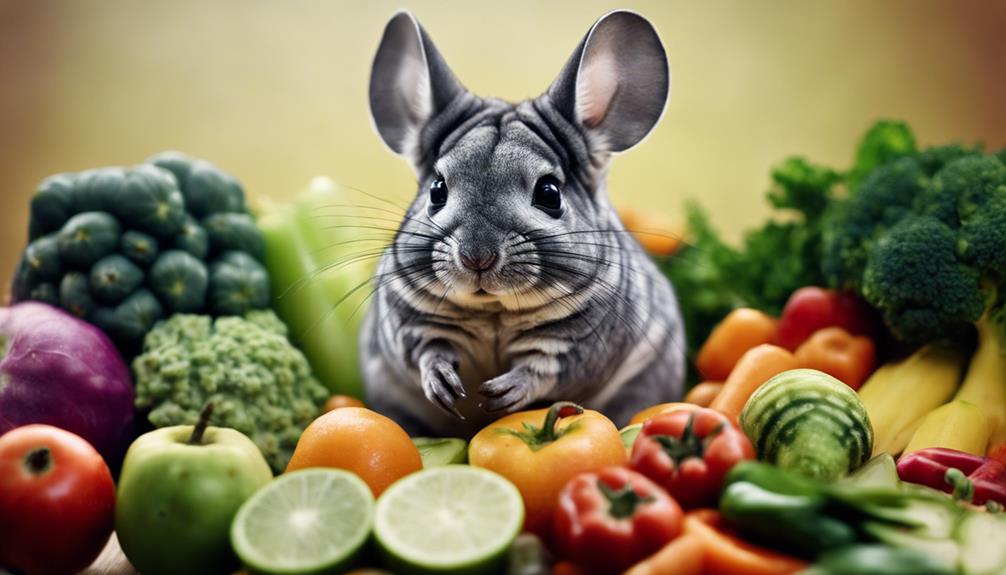
Monitoring your chinchilla’s nutritional supplements and making necessary diet adjustments is crucial to support their health during a period of decreased appetite. To ensure your chinchilla receives the necessary nutrients and stays healthy, consider the following:
- Dietary adjustments: Consult with a veterinarian to determine if any changes to your chinchilla’s diet are needed. They may suggest adding more hay or providing specific vegetables to entice eating.
- Nutritional supplements: In some cases, your chinchilla may benefit from nutritional supplements. These can help bridge the gap in essential nutrients when appetite is low.
- Feeding schedule: Establish a consistent feeding schedule to encourage regular eating habits. Chinchillas thrive on routine, so keeping a set feeding time can help stimulate their appetite.
- Appetite stimulants: If your chinchilla continues to show a lack of interest in food, your vet may recommend appetite stimulants. These can help kickstart their desire to eat, aiding in their recovery process.
Behavioral and Environmental Factors to Consider
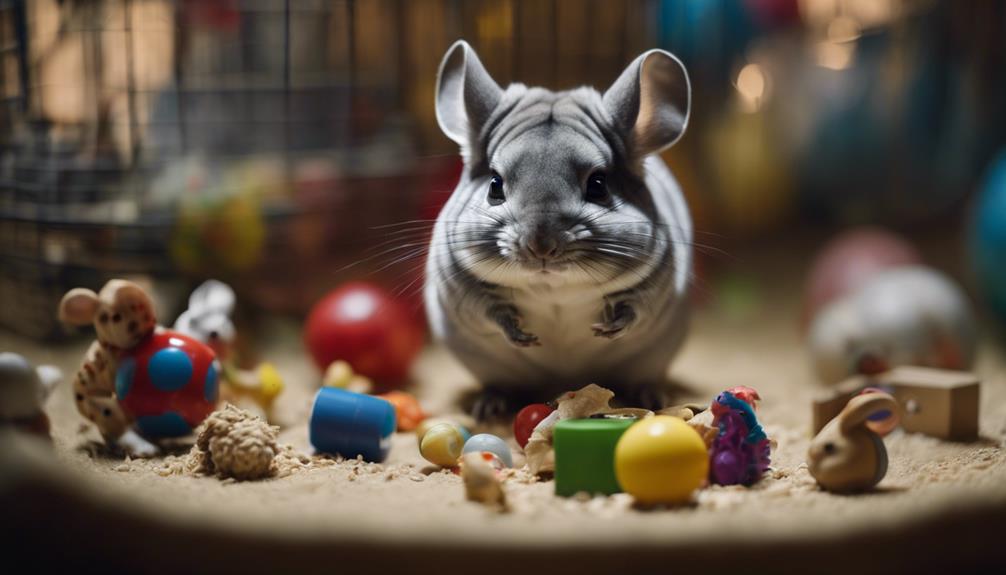
When addressing behavioral and environmental factors impacting a chinchilla’s eating habits, it’s essential to consider their living conditions and daily interactions. Chinchillas are sensitive animals that thrive in enriched environments. Providing enrichment activities such as chew toys, tunnels, and exercise wheels can stimulate their minds and prevent boredom, which may affect their appetite. Additionally, stress management plays a crucial role in a chinchilla’s overall well-being. Loud noises, sudden movements, or changes in their surroundings can lead to increased stress levels, resulting in a loss of appetite.
Habit changes, such as altering their feeding schedule or introducing new foods, can also impact a chinchilla’s eating behavior. It’s important to monitor any adjustments closely to ensure they’re positively received. Moreover, social interaction is vital for chinchillas as they’re social creatures. Lack of companionship or inadequate interaction with their human caregivers can lead to decreased interest in food. By addressing these behavioral and environmental factors thoughtfully, you can help your chinchilla regain their appetite and overall health.
Frequently Asked Questions
Can Stress or Anxiety Cause a Chinchilla to Stop Eating?
Stress management is crucial for chinchilla behavior. Changes in environment or routine can lead to anxiety, affecting their appetite. It’s essential to monitor their diet and health closely. Consider diet modifications and seek veterinary advice if necessary to ensure the chinchilla’s well-being.
How Can I Tell if My Chinchilla Is Experiencing Dental Issues That May Be Impacting Their Appetite?
Regularly check a chinchilla’s dental hygiene to prevent issues that impact appetite. Signs of dental problems include decreased appetite, drooling, and changes in behavior. Understanding these correlations can aid in early detection and treatment.
Are There Any Specific Foods or Treats That Can Help Stimulate a Chinchilla’s Appetite?
Looking to entice a picky chinchilla’s appetite? Nutritious treats like rose hips or dried herbs are great appetite stimulants. These can pique their interest and provide essential nutrients. Who knew treats could be so helpful?
How Long Can a Chinchilla Go Without Eating Before It Becomes a Serious Concern?
A chinchilla can go without eating for about 24 hours before dehydration becomes a concern, and weight loss may follow. Monitoring their food intake closely is crucial to prevent any health issues.
Are There Any Natural Remedies or Alternative Therapies That Can Help Improve a Chinchilla’s Appetite?
Herbal remedies and acupuncture techniques can sometimes help improve a chinchilla’s appetite. These natural approaches may offer gentle support and promote overall well-being. It’s essential to consult with a veterinarian before trying alternative therapies.











